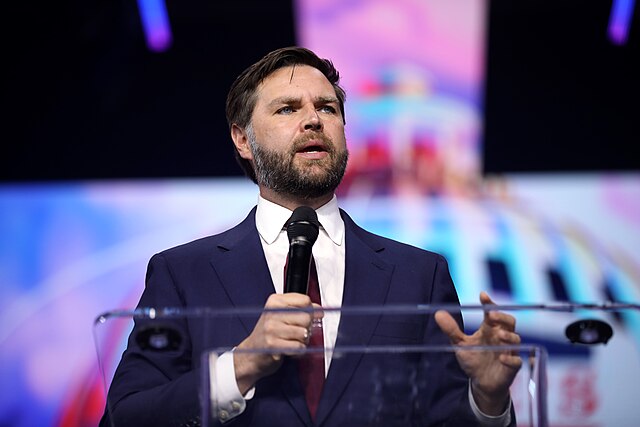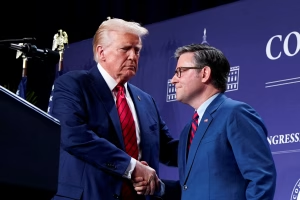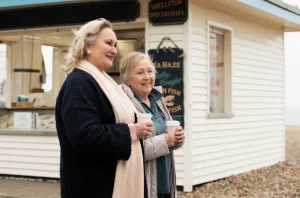Vance Opens Up About His Political Future — Carefully
Vice President J.D. Vance sat down with Fox News host Sean Hannity on Thursday night for what began as a routine interview on the administration’s agenda — and became one of the most noteworthy political conversations of the week. Pressed repeatedly about whether he’s weighing a 2028 presidential run, Vance acknowledged that he has thought about the future, but emphasized that any decision will come only after the 2026 midterm elections and only in consultation with President Trump.
Many political observers have speculated that Vance, widely viewed as Trump’s ideological heir, could become a frontrunner the moment he enters a race. But the vice president made clear he is not jumping ahead.
“I’ve thought about what that moment might look like after the midterms,” Vance told Hannity. “But every time I start thinking about that, I remind myself that the American people elected me to do a job right now.”
He insisted he would not allow future ambitions — or speculation — to distract him from the administration’s work in the present.
Hannity Presses the Question — Vance Stays Disciplined
Hannity, who has interviewed nearly every major Republican figure over the last two decades, didn’t let the subject go easily.
“You’re in the Oval Office every day,” Hannity said. “Two days after the midterms, the country goes straight into the 2028 cycle. You have to think about it — right?”
Vance smiled, then answered carefully:
“If you start getting distracted and focused on what comes next, it actually makes you worse at the job you have right now,” he said. “My attitude is: focus on the job. If we do a good job, politics will take care of itself.”
But Vance offered one unmistakable signal — a promise that he will meet personally with Trump after the midterms to discuss whether he should run.
“We’re going to win the midterms, and then after that I’m going to sit down with the president and talk to him about it,” he said.
Midterms First: Vance Frames 2026 as Make-or-Break
Throughout the interview, Vance repeatedly stressed the importance of the upcoming 2026 midterm elections, framing them as a referendum on the progress Trump has made in his second term.
“What the president has set in motion is a long-term economic revitalization effort,” Vance said. “Trees have been planted that won’t even bear fruit for a few years. I don’t want Democrats to screw that up.”
Vance laid out the administration’s case bluntly: if Republicans hold Congress, Trump’s largest economic and law-and-order initiatives will have room to fully mature. If Democrats regain power, he warned, they will try to dismantle the gains made over the last ten months.
“We’ve got over a year to do as much as we can for the American people,” he said. “Winning the midterms is essential to that mission.”
Trump’s Role in 2028: Still the Deciding Force
Vance’s comments come amid ongoing speculation about what Donald Trump will do after his current term ends — including Trump’s own playful teasing about a hypothetical third term.
“I’m not allowed to run,” Trump said last month. “It’s too bad. We have a lot of great people.”
The remark, delivered with Trump’s signature wink-and-grin style, set off another wave of commentary. Some analysts took it literally, while others saw it as the president trolling his critics — particularly Democrats who still panic at the possibility of Trump finding a legal pathway to remain in power.
Trump has also floated potential future tickets in jest, including a Vance–Rubio pairing, a suggestion many supporters responded to enthusiastically.
Regardless of what Trump ultimately chooses to do, Vance made it clear that no decision about 2028 will be made without Trump’s blessing.
A Political Alliance That Has Become Central to the GOP
The Trump–Vance partnership has grown into one of the most influential alliances in modern Republican politics. Vance is often seen as the sharpest policy mind in Trump’s inner circle and one of the most aggressive advocates for the administration’s populist economic agenda.
Behind the scenes, senior GOP operatives increasingly view Vance as the natural continuation of the Trump era — younger, deeply ideological, rhetorically polished, and fully aligned with the movement’s priorities.
But in this interview, Vance resisted all attempts to confirm the speculation, refusing to get ahead of the moment.
“If we do the job the American people hired us to do, then everything else will take care of itself,” he said.
Crime Declines in Washington, D.C.: A Major Trump–Vance Policy Win
Toward the end of the segment, Hannity shifted the conversation to another subject dominating headlines: the sharp decline in violent crime in Washington, D.C., following the administration’s decision to dramatically increase the presence of federal law-enforcement personnel in the capital.
The topic gained renewed attention after ABC News anchor Kyra Phillips revealed she was “jumped” just two blocks from her D.C. studio during the past two years — one of many incidents that occurred near the network’s bureau.
Phillips said crime had become an unavoidable part of everyday life for the network’s employees, noting that at least two ABC staffers had been victims of separate incidents.
However, new public-safety data from the Metropolitan Police Department shows that violent crime in the nation’s capital has dropped significantly since 2023. Many residents credit the Trump administration’s aggressive surge of federal law-enforcement units, which targeted the gangs and cartels driving much of the violence.
Scores of D.C. residents — even those who oppose Trump politically — have publicly praised the administration’s crackdown.
“It’s the first time the city has felt safe in years,” one Adams Morgan resident told a local news affiliate. “If that took Trump sending in federal agents, so be it.”
For Vance, the results validate one of the administration’s key arguments: that Democrat-run cities have suffered from weak enforcement policies, soft-on-crime prosecutors, and years of leniency that emboldened increasingly violent offenders.
“The president is delivering exactly what he promised,” Vance said. “Safety, security, and accountability.”
Why Vance’s 2028 Comments Matter
While Vance stopped short of announcing anything definitive, his remarks send several unmistakable political signals:
1. Vance is considering 2028 — seriously.
He admitted he has thought about it and has already considered what a decision-making moment would look like.
2. Trump will be the deciding factor.
Vance will not move forward without Trump’s guidance and approval — reinforcing Trump’s continued dominance over the GOP.
3. The administration sees the 2026 midterms as the pivotal moment.
Vance is positioning the election as the gateway to Trump’s legacy — and possibly the launchpad for his own future.
4. The message is: focus now, decide later.
Vance wants voters to see him as working, not campaigning.
The Road Ahead
For now, Vance is doing exactly what he says: focusing on the present. The administration is preparing a sweeping set of economic, immigration, and law-and-order initiatives over the next year, and the vice president is deeply involved in all of them.
But the political realities won’t wait forever. The country will enter the 2028 cycle the moment the midterms conclude. Whether Vance becomes a central figure in that race will depend on the conversation he has pledged to have with Trump — in private, behind closed doors, after the ballots are counted.
Until then, his message is simple: do the job first, talk politics later.

Emily Johnson is a critically acclaimed essayist and novelist known for her thought-provoking works centered on feminism, women’s rights, and modern relationships. Born and raised in Portland, Oregon, Emily grew up with a deep love of books, often spending her afternoons at her local library. She went on to study literature and gender studies at UCLA, where she became deeply involved in activism and began publishing essays in campus journals. Her debut essay collection, Voices Unbound, struck a chord with readers nationwide for its fearless exploration of gender dynamics, identity, and the challenges faced by women in contemporary society. Emily later transitioned into fiction, writing novels that balance compelling storytelling with social commentary. Her protagonists are often strong, multidimensional women navigating love, ambition, and the struggles of everyday life, making her a favorite among readers who crave authentic, relatable narratives. Critics praise her ability to merge personal intimacy with universal themes. Off the page, Emily is an advocate for women in publishing, leading workshops that encourage young female writers to embrace their voices. She lives in Seattle with her partner and two rescue cats, where she continues to write, teach, and inspire a new generation of storytellers.









